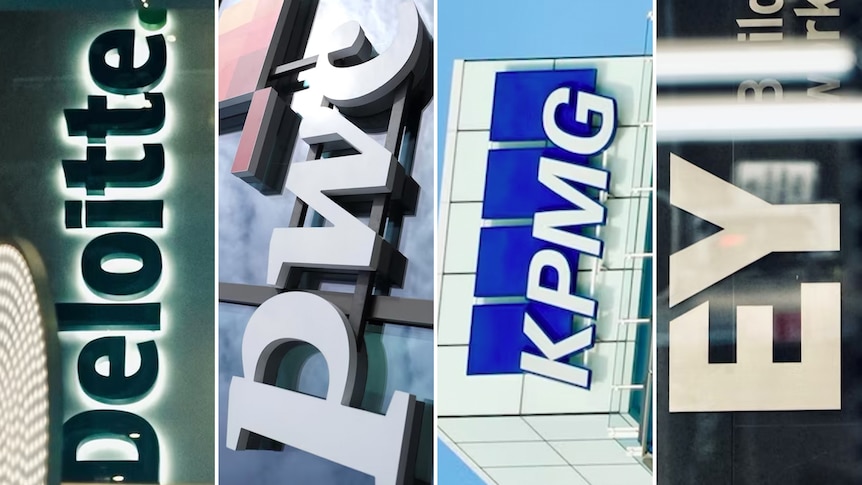The big four accounting giants racked up billions of dollars in auditing fees in the private sector as the quality of auditing declined, heightening concerns it could trigger another Enron-type corporate collapse.
The infiltration of the big four — EY, Deloitte, KPMG and PwC — in government departments has been well documented. What is less well known is their role in the private sector as auditors sprinkling holy water over company financial accounts, as well as offering consultancy services spanning tax minimisation advice, cyber security, IT and strategy.
Their power extends to the boardrooms of corporate Australia, where hundreds, possibly thousands, of alumni are directors of the most powerful organisations.
Governance and proxy adviser Ownership Matters crunched the numbers for 7.30, using four years of data, to unveil a series of uncomfortable truths about the depth and breadth of the big four across the country’s ASX 300 companies.
Until now, the big four accounting firms had built themselves an aura of credibility and trust in government and corporate Australia.
The data reveals that 97 per cent of the external audit work of the ASX 300 companies was done by the big four.
These companies shelled out an estimated $4 billion in auditing and consulting fees to the big four between 2018 and 2022. But the concentration is in the biggest companies, with the top 20 ASX companies accounting for 50 per cent of the fees.
Even more concentrated are the big four banks — CBA, Westpac, National Australia Bank — and Macquarie Group, which spent a combined $832 million over four years, making them the biggest users of the big four’s services.
But the real figure is unknown as listed companies only disclose consulting work done by their auditors, not other consultancy work.
And when it comes to servicing the $3.5 trillion superannuation industry, unlisted companies and trusts, the figures could be even more.
Alarmingly, while the big four have been dominating auditing, corporate watchdog ASIC has found the quality of auditing is declining. It is something Professor Allan Fels told 7.30 is a sleeper issue that could trigger a corporate collapse.
“We know that the global financial crisis of 2008 was partly triggered by bad auditing,” Professor Fels said. “I have deep fears that something similar could occur to topple the global and the Australian economy in the coming period.”
Last year, ASIC’s inspection reports found deficiencies in a third of the biggest firms. Separate reviews found negative findings in 50 per cent of Deloitte’s auditing cases and 48 per cent of KPMG’s.
Accounting professor John Dumay described it as a market failure.
“To me, the value out of the audit is to be able to go to the investor and say, ‘we have a good company, we’re performing well, the auditors come and have given us a tick in a box, a clean bill of health, you can trust what we’ve got to say.’ That’s what an audit is supposed to do,” he says.
“When it doesn’t do that, because there are deficiencies in the audits themselves, then the system breaks down.” People silhouetted against a white and blue KPMG logo.
Auditing plays a crucial role in the integrity of the financial system. Banks, investors, staff, suppliers and superannuation funds all rely on an auditor’s independent assessment of financial accounts to ensure they can be trusted to make informed decisions.
When it fails it can be catastrophic. The collapse of Enron torched tens of billions of dollars of shareholder and employee money after it emerged that its financial accounts were a sham and it couldn’t pay the bills.
In Australia, there are at least 10 legal actions underway, all alleging substandard auditing and advisory work across the big four firms. The cases include Noumi (formerly called Freedom Food Group) and its auditor Deloitte, the collapsed construction group Hastie Group and sandalwood producer Quintis, all of which misreported their accounts despite their auditors giving their stamp of approval. When the truth came out, shareholders took a drubbing.
Against this backdrop, Labor senator Deborah O’Neill recently reopened a parliamentary inquiry into the auditing industry to investigate the structure, deficient regulation and conflicts.
She will also look at why ASIC decided as part of a restructure it would abandon inspection reports, shrink the audit team and dump its highly regarded chief accountant, Doug Niven.
“It’s hard to believe that this relatively new program, which was actually shedding some light on what was going on inside the big four, has been lost in a reshape of ASIC,” she says. “I have grave concerns if nobody is watching. That’s the perfect conditions in which further degrading of the quality of audit is likely to occur.”
Senator O’Neill said conflicts had become the business model of the big four. “What we’re observing is a business model where the conflict of interest is the model of business. That’s how you grow your business,” she told 7.30. “It’s a failure of regulatory oversight that’s allowed this to fester. And we cannot allow it to continue.”
She says the longer an audit firm is inside a company, the more enmeshed relationships become.
It means the independence of the audit firm becomes questionable, which can impact their appetite to stand up to clients if accounting irregularities are suspected. If auditors act in the dual role as consultant, that independence can be further compromised.
Ownership Matters found that non-audit fees as a proportion of audit work for the audit firms was 39 per cent across the ASX300 companies between 2018 and 2022. This is where the big four act in the dual role of independent auditors and consultants, which is fraught with conflicts of interest.
Construction and developing giant Lendlease has had KPMG as its independent auditor for more than 65 years and their head offices are in the same building in Sydney.
They are also embroiled in a tax scandal with whistleblower Tony Watson, a tax lawyer whose career fell apart when he accused his client Lendlease of double dipping on tax, which he believed was wrong.
“I told them that they were stealing from our children, they were stealing from taxpayers,” he told 7.30.
He joined law firm Greenwoods & Herbert Smith Freehills in 1985, quickly moving up the ranks to become partner, managing its biggest client, Lendlease.
But things started to unravel when he told a senior executive he disagreed with a tax scheme that related to their retirement village acquisitions. He estimates it boosted profits by up to $300 million, which he says they weren’t entitled to.
He says PwC was brought in for advice and backed the scheme. KPMG signed off on the accounts.
Mr Watson alleges in a court case lodged in the Federal Court against his law firm and Lendlease that by 2014 he was dumped from the Lendlease account. He spiralled into depression and while he was on unpaid sick leave, he was terminated.
“I just got a letter from them saying we’ve decided to terminate you,” he tells 7.30
When he recovered from his breakdown, he says, he decided to revisit his concerns about Lendlease and its tax scheme, this time meeting senior Lendlease officials and a partner at PwC as well as writing letters to the company.
In one email, he says Lendlease is “taking an aggressive and wrong view” in its tax deductions. In another, he warns the ATO will not fall for it. He also tipped off the ATO, which is auditing this aspect of the company.
Now he is waiting for the ATO to give its verdict and for his legal action to go through the courts.
In a statement, Lendlease said it “periodically conducted robust audit tender processes,” and that its auditor “KPMG had the strongest credentials and commercial insights” after its last tender a decade ago. Last year, it said it would conduct an audit tender process in 2023.
In a statement, it said, “in May 2023, we paused this process with the intent for it to be resumed at a later date”. The company said it was confident its tax treatment was consistent with the law.
KPMG said in a statement: “We believe directors are best placed to determine the need for a change of auditors.” It said its focus was on “delivering high-quality audits, and a deep understanding of the business is critical to achieving this”. It added that “KPMG has comprehensive policies and processes in place to manage potential conflicts”.
KPMG said ASIC’s inspection reports were disappointing. It said it agreed with some but not all of ASIC’s findings and it had launched an audit quality transformation program.
Deloitte said it was committed to delivering the highest quality audit services to clients and it remained focused on doing everything it could to deliver “trusted and expert” audit services for its clients.
ASIC said moving forward, it would combine its annual audit reviews with surveillance of financial reporting and that “targeted reviews of the quality control systems of the largest six firms will also be undertaken from time to time”.
It said continuing to provide annual individual reports on the biggest firms “would not provide a meaningful measure of overall audit quality”.
PwC declined to comment on Mr Watson’s allegations but said: “PwC firms are subject to our global tax code of conduct, which requires tax positions be supported by credible basis in tax law.”
For those who are unfamiliar with the world of public accounting -
- Audit is an expense. It doesn’t help the bottom line of the clients. There is a push from the clients (and therefore partners) to do it in as few man-hours as possible instead of doing it well to reduce expenses.
- Public Accounting is purposefully structured in a manner so that the new employees work 80, 90 hour workweek for their first few years and burn out, so that the partner at the top gets a bigger share of the profit.
- Public Accounting firms get paid by their clients who depend on them to give them a favorable opinion. These companies need audit reports every year and will be choosing a different auditing firm for the subsequent year if the process is difficult or if they try to do an actual audit.
- Australia.
deleted by creator
Absolutely correct on all counts. Public accounting is a field that has been completely captured by the industry. A simple way to reduce conflict of interest is to nationalize the audit arms of the big 4. That also increase pay per work hour (for those who are not partners), and guards against tax evasion at the same time, probably more than paying for itself.
But this won’t ever be considered as a legitimate solution to for some reason…
lol, it’s joever
at least our governments, federal and state, will still be able to function with their public service departments that haven’t been gutted and replaced with big 4 consultants and contractors if our entire system collapses because every single corporation’s reports and auditing are all complete bullshit…
oh wait
It’s not just the big four

The amount of burned-out Accenture people working in local/state governments doing a lousy (more than usual) job is alarmingly high
deleted by creator
the fear should be another Anderson not another Enron, and end up with the Big Three





